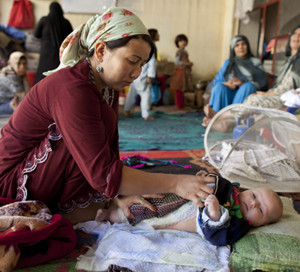By Ken Hanly
Even though the Taliban government in Afghanistan fell more than ten years ago, the justice system is still discriminatory in its treatment of women as is the legal system.Al Jazeera reporter, Jennifer Glasse reports from Herat at a women's jail. Many Afghan women are in jail for fleeing domestic abuse or violence. Even rape victims are jailed for what are called "moral crimes" as the appended video shows, Afghanistan is unique even among those countries which base their judicial system on Sharia law in that Afghanistan is the only jurisdiction which claims there is a crime of fleeing. Heather Barr, Afghan Researcher, at Human Rights Watch said: "Afghanistan is the only Islamic government in the world that specifically criminalised running away." There is no mention of the offense in Afghan law. The problem of running away could be solved if Afghanistan had more women's shelters and other programs.

Prisoner Sara Gul, 26, changes her baby's diaper inside the women's prison in Mazar-e-Sharif, Afghanistan. Sara has been in prison for six months after running away from her home to escape her husband. (Photo: Paula Bronstein/Getty Images)
A report issued by Human Rights Watch last year, claims that hundreds of women and girls are imprisoned for the moral crimes of running away from home, and sex outside of marriage.The report had called for an estimated 400 women to be freed so that the Afghan government would fulfill its obligations under international human rights law.
Kenneth Roth, executive director of Human Rights Watch said:"It is shocking that 10 years after the overthrow of the Taliban, women and girls are still imprisoned for running away from domestic violence or forced marriage." Actually, it is not that surprising. Many of the former warlords whom the west helped triumph over the Taliban were just as violent against women if not worse than the Taliban. Also, there are so-called reformed Taliban in the government. They probably hold the same views about women as unreformed Taliban but support the government.
The criminalisation of "running away" results from a certain latitude given judges under article 130 of the Afghan constitution:
"When there is no provision in the Constitution or other laws regarding ruling on an issue, the courts’ decisions shall be within the limits of this Constitution in accord with the Hanafi jurisprudence and in a way to serve justice in the best possible manner."
Afghan judges and prosecutors say that this allows judges to interpret Islamic law and justifies their ruling on fleeing. Heather Barr says that the judges and prosecutors are ignoring the limits of the section in that the interpretations should be consistent with other provisions of the constitution and lead to a just outcome. Heather Barr thinks that the decisions violate article 130 of the constitution which says: "No person can be punished but in accordance with the decision of an authorised court and in conformity with the law adopted before the date of offense". Some local Afghan rights workers were critical of the report for not examining the laws more carefully upon which distinctions are made and not interviewing women who have run away and are actually in shelters to determine the different circumstances that determine legal outcomes.
Ahraf Nemat, an Afghan human rights campaigner, said that the Human Rights Watch report would be taken as a general statement of impunity for the 400 or so women imprisoned. Nemat said that it is equally important that women who commit crimes should face justice.



